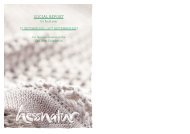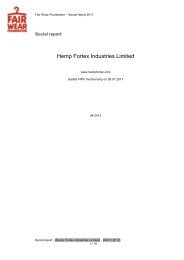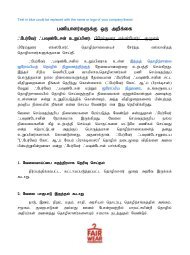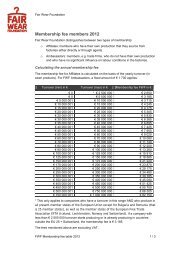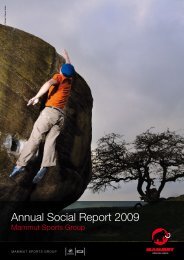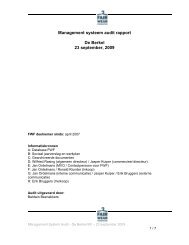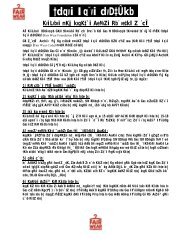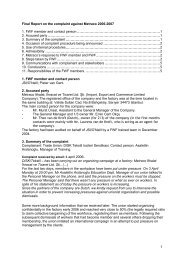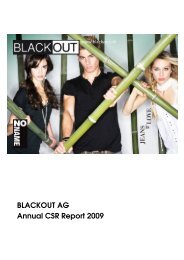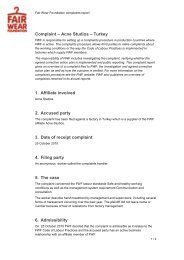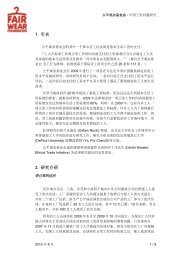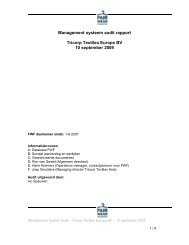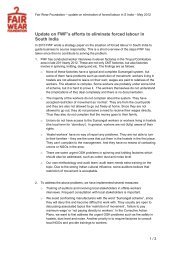October 2012 - Fair Wear Foundation
October 2012 - Fair Wear Foundation
October 2012 - Fair Wear Foundation
You also want an ePaper? Increase the reach of your titles
YUMPU automatically turns print PDFs into web optimized ePapers that Google loves.
<strong>Fair</strong> <strong>Wear</strong> <strong>Foundation</strong><br />
turnover was produced in low risk countries in the European Union. Another 33% of<br />
ODLO’s turnover has been audited in the past three years. Thus ODLO is considered to<br />
have monitored 93% of its total turnover, which meets FWF’s threshold of 90% for the<br />
4 th year of membership.<br />
Most ODLO factory audits were conducted by FWF local audit team. The factory in<br />
Israel – producing 9% of the turnover - was audited by an auditing company initiated by<br />
another buyer. ODLO acquired the audit report and assess the quality of the report<br />
together with FWF verification staff. The corrective action plan from that audit has been<br />
discussed with the factory management.<br />
2.2 ODLO has a system to follow up on the corrective action plans resulted from the<br />
audits. The CSR responsible staff and the management of sourcing department were in<br />
touch with factory management to discuss the issues regularly. 100% of the corrective<br />
action plans have been discussed with the suppliers.<br />
2.3 ODLO cooperates with two other members of FWF to follow up a corrective action<br />
plan regarding their common supplier in China.<br />
3. Complaints procedure<br />
Conclusions<br />
3.1 The CSR responsible person of ODLO is the designated person to handle<br />
complaints filed by workers of their suppliers.<br />
3.2 In <strong>2012</strong>, no complaint from workers of ODLO’s suppliers has been filed to FWF’s<br />
local complaints handlers.<br />
3.3 In general ODLO makes good effort to ensure suppliers to post the Code of Labour<br />
Practices at the factories so that workers have access to the information of FWF and its<br />
complaints handler. In low risk countries, ODLO has not yet built up a system to ensure<br />
that this practice is done properly.<br />
3.4 FWF conducted two verification audits in <strong>2012</strong> at suppliers of ODLO. It was found<br />
that the Code of Labour Practices (CoLP) was posted at both suppliers. At the supplier<br />
in Thailand, the CoLP did not include the telephone number of the complaints handler.<br />
The workers in this factory were also not aware of FWF and its CoLP.<br />
Recommendations<br />
3.3 & 3.4 It is recommended that ODLO asks its suppliers in low risk countries to send<br />
photos of the CoLP being posted. Staff of OLDO could then regularly check if the<br />
documents are posted as reported by suppliers.<br />
4. Labour conditions and improvements<br />
Conclusions<br />
FWF believes that transparency regarding working conditions in factories is of added<br />
value in working towards compliance with labour standards. Based on results of audits<br />
carried out by FWF teams to verify improvements FWF has drawn up an overview of<br />
improvements in labour conditions in factories. The overview is annexed to this report.<br />
The overview includes results of audits by FWF local audit teams. Results of audits by<br />
Performance Check – ODLO – <strong>October</strong> <strong>2012</strong> 6 / 11



